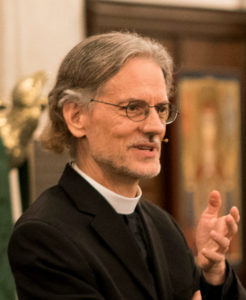Against Sudden Death
In the Great Litany one finds the following petition: “From lightning and tempest; from plague, pestilence, and famine; from battle and murder, and from sudden death, Good Lord deliver us.” Why is “sudden death” in this list? What is wrong with sudden death? Most people want to die quickly; they don’t want to look at death coming towards them. They fear it may be painful, or drawn-out and undignified. They don’t want to burden others, and they don’t want to suffer themselves. It would be better, they say, just to be hit by a truck and be over with it.
Why did traditional piety ask God to spare us from “sudden death”?
There is a clue in more recent versions of this Litany. Instead of deliverance from “sudden death,” we now pray to be saved from “dying suddenly and unprepared.” It’s not the suddenness per se that is the problem, but rather that in dying suddenly one might fail to be prepared for death.
This is a hard lesson for many people: that we should prepare for our deaths. So much of our medicalized existence is aimed at extending the length of life, delaying death as long as we can. Our gut says that if we want to die, we will be giving up. We don’t want to be quitters! We want to push on for as long as we can. It is indeed true that, for the most part, pushing on can be an exercise of moral courage, for instance, when one bravely undergoes difficult medical treatments. If a proposed treatment is likely to provide benefit to us, then, normally speaking, we should take it on. To cite a personal instance: It was right for my wife to undergo surgery, radiation, and chemotherapy when a brain tumor was found. These treatments promised to kill off the cancer, and they were successful—she went on to live many more years. Even though her later years were marked by mental declines caused by those treatments, her life was a blessing to more people than she ever knew.
That said, curing sickness cannot be the only focus of our lives. Every one of us will die; it is wisdom to pray that we not die unprepared.
When he was in his eighties, my father had a recurrence of cancer. He consulted his oncologist and decided not to try to defeat the disease: The treatments were unlikely to succeed and their effects would have been a great burden. As he came close to the end, many people visited him, lots of friends and neighbors. I was there for some of these visits. Again and again, a visitor would try to put into words what their friendship had meant. And my father would say, at once with tears and a smile, “I’ve had a good life, and I’m looking forward to meeting Jesus.”
How do we prepare for death? Actually, it’s not hard. There are two things: Give thanks, and say “I’m sorry.” We do both of these in prayer. We also do them when we engage with other people. To whom do I want to say “thank you” while I still can? And to whom should I say “I’m sorry”? These exercises are how we prepare for death.
There’s no reason to put them off. “Thank you.” “Forgive me.” How good it feels to speak from the heart! It turns out—O wonder of divine providence!—that preparing to die is the best way to live.










